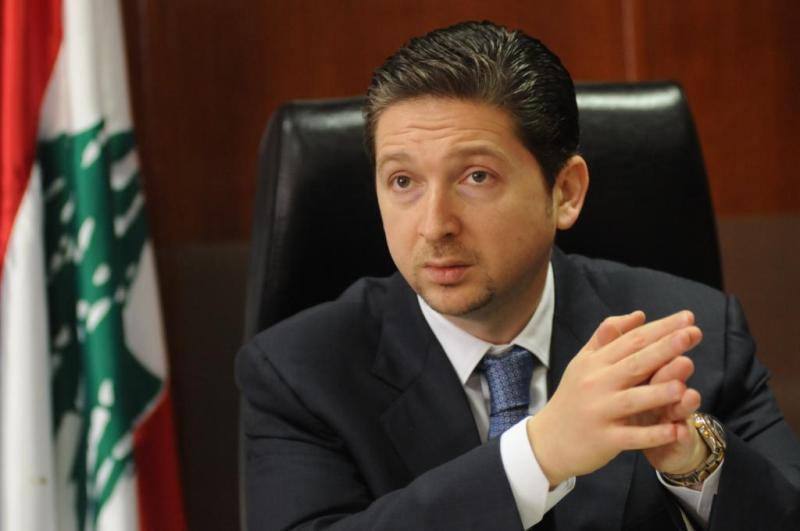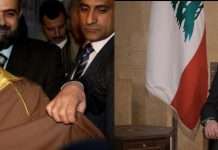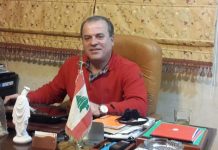New Sunni opposition, supported by Hezbollah, challenges Hariri
معارضة سنية جديدة مدعومة من حزب الله تتحدى الحريري
Sami Moubayed/The Arab Weekly/July 02/18
Faisal Karami, saying he commands a bloc of ten seats in parliament, hopes to revive his family legacy and is demanding a post in the upcoming cabinet.
BEIRUT – A handful of Sunni politicians have created an “independent Sunni bloc” to challenge Lebanon’s interim Prime Minister Saad Hariri, who won 20 seats in May’s parliamentary elections.
Leading the meeting was Faisal Karami, 46, scion of a leading political family from the northern city of Tripoli. His father Omar, uncle Rashid and grandfather Abdul Hamid Karami were all prime ministers before the Rafik Hariri era (1992-98).
Omar Karami was toppled in 1992 and 2005, most recently after the Rafik Hariri assassination. Rashid Karami was one of the pillars of Lebanese politics, who created ten governments in his country’s history, the first in 1955 and the last in 1984. He was killed in 1987 during the civil war after a bomb exploded on his helicopter, a crime Samir Geagea of the Lebanese Forces, an present ally of Saad Hariri, was accused of plotting.
As for their father Abdul Hamid — Faisal’s grandfather — he was one of the leaders of the Lebanese independence movement from colonial France who served as a prime minister in 1945.
The Karamis, like the Salams of Beirut, with legacies stretching into the 19th century, feel they were collectively sidelined by the dramatic rise — and death — of Rafik Hariri, who was from an unknown political family in Sidon, rose to power through his incredible wealth and the backing of Saudi Arabia. His death in a February 2005 bombing made the country’s established nobility look and feel insignificant. Faisal Karami, saying he commands a bloc of ten seats in parliament, hopes to revive his family legacy and is demanding a post in the upcoming cabinet. His alignment with ten MPs effectively breaks Hariri’s monopoly over Sunni representation, given that none are associated with Hariri’s Future Movement.
They instead have branded themselves as the “Sunni Opposition” to Hariri, who is Sunni as well. They say they are critical more of his performance than his policies in government. Karami served as a cabinet minister in 2011, when he was literally imposed on the cabinet by his allies in Hezbollah. Some coined him the “sixth Shia minister” because of his allegiance to the all-Shia party and to the Syrians.
Karami says his bloc is entitled to at least one seat in the next cabinet and possibly two, based on a proposal by Lebanese President Michel Aoun, saying that major blocs are entitled to one seat in government for every four they control in parliament. Hariri has declined to name any member of the Sunni opposition, leaving it for Aoun to decide.
The Hariri team would get five seats in the government but Karami’s allies in the March 8 Alliance would whip up an impressive 14 portfolios, given their high representation in the Lebanese chamber. Lobbying on his behalf by Hezbollah will determine whether Karami makes it into the Hariri cabinet. The same cannot be said for his Sunni partners, however, who are mostly colourless parliamentarians. Their only chance for serious political elevation is if Karami makes it into government, giving them a real voice in parliament.
The Karami bloc includes Adnan Trabulsi (Beirut); Elwaleed Sukariyeh (Bekaa); Jihad al-Samad (Danniyeh, North Lebanon); Usama Saad, a Nasserist; and Kassem Hachem, a dentist turned politician from South Lebanon. None can match up to powerful — and wealthy — Sunni politicians such as Hariri or former Prime Minister Najib Mikati, who swept votes in his native northern city of Tripoli, winning all four seats. The only heavyweight among them is Abdul Rahim Murad, a seasoned politician, former defence minister, philanthropist and self-made billionaire who owns and runs the Lebanese International University. However, within the bloc, he is as politically ambitious as Karami — if not more — and would rather see himself in the Hariri cabinet, if one name were to make it from the “Sunni Opposition.”
Second, Karami is on bad terms with Saudi Arabia, the traditional backer of the Lebanese Sunnis. True, Riyadh has been reaching out to a wider assortment of allies in Lebanon but has not reached the point of courting figures — such as Karami — who were highly critical of its policies in Syria and Yemen.
In the past three years, Saudi Arabia has tried telling the world that Hariri is its ally in Lebanon but he is not its only ally, promoting Mikati as an alternative favourite.
Third, Mikati refused to join the Karami bloc, expressing his dissatisfaction with the term “Sunni,” seeing himself as a leader for all Lebanese. The former prime minister did not attend the opposition meeting and nor did Fouad Makhzoumi, the self-made Beiruti tycoon who was just voted into parliament while running on an independent ticket.
The reasons behind their absence, said political analyst Nidal al-Sabe, is Mikati’s attempts at keeping the Saudis satisfied “while remaining as far as possible from Syria and Hezbollah, whereas Makhzoumi sees that the opposition meeting’s main objective is to make Faisal Karami ministers, at a time when he too wants a ministerial post.” Sabe added: “Additionally, Makhzoumi doesn’t want to enter into a confrontation with Hariri, especially not in Beirut, insisting that he is an independent standing at a distance from both the March 8 (pro-Syria) and March 14 (anti-Syria) alliances.
“Prime Minister Hariri is facing a new Sunni reality that he is unfamiliar with, especially after the last elections created a new Sunni reality. He has to either accept this reality or reach a collision with Hezbollah and its allies, resulting in a delay of the cabinet formation.”
*Sami Moubayed is a Syrian historian and author of Under the Black Flag (IB Tauris, 2015). He is a former Carnegie scholar and founding chairman of the Damascus History Foundation.




















